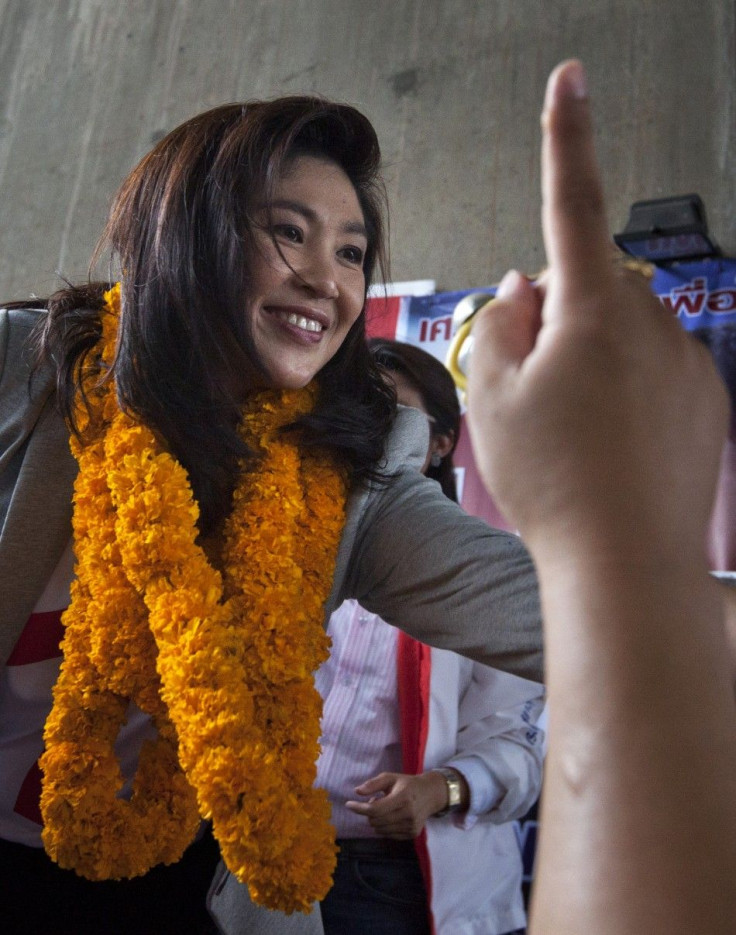New Elections Could Bring Ousted Politician Back to Thailand

Sunday's general elections in Thailand could again shake up the country's often unsteady democracy.
Opinion polls show newcomer Yingluck Shinawatra ahead of incumbent Abhisit Vejjajiva of Thailand's Democratic Party in advance of the July 3 vote. If Yingluck succeeds, some voters fear that the military may intercede.
Yingluck, leader of the Pheu Thai Party, is no ordinary politician. The youngest sister of exiled former Prime Minister Thaksin Shinawatra, Yingluck plans to hand power back to her brother post-election.
The Pheu Thai Party itself is the latest incarnation of Thaksin's Thai Rak Thai party, which he founded in 1998.
Thaksin, a powerful businessman, ran for and won the prime minister's seat in 2001. But in 2006, Thaksin was overthrown in a bloodless military coup in 2006 while he was out of the country, and sentenced on charges of corruption and having conflicts of interest.
Fleeing incarceration, Thaksin currently lives in Dubai.
Although she claims that Thaksin wouldn't run her government, Yingluck has surrounded herself with her brother's aides and friends. Thaksin even called his sister his clone politically.
Thaksin is widely popular, especially among rural and poor voters, but his return may invite trouble.
The head of Thailand's royal military has been accused to siding against Pheu Thai, as it has done in the past. Army chief Prayuth Chan-ocha was instrumental in the 2006 coup that exiled Thaksin, and there is speculation that Prayuth would do it again given the chance.
The army sees Thaksin as an enemy of the monarchy, a serious offense in Thailand.
But, if Pheu Thai fails to win the election, there may be trouble nonetheless. Thaksin's supporters, known as the Red Shirts, are famously fervent. In 2010, the Red Shirts staged massive protests and took over parts of Bangkok for months. The demonstrations, which escalated into gun battles between supporters and the military, left 90 people dead.
Democracy has been troubled in Thailand since its inception.
The roots of the current situation reach back into Thailand's modern history. The country is vulnerable to political unrest spurred by decades of economic inequality and unstable democracy.
Since 1932, Thailand has had 27 prime ministers over a period of 78 years, interim leaders excluded. Of those 27, only Thaksin has completed a full term. Although many served multiple terms, all of the other prime ministers either resigned, were forced out by parliament or the constitutional court, or were overthrown by a military coup.
Thaksin's popularity and prowess grew thanks to a number of economic reform policies geared toward the country's rural majority.
In his first year in office, Thaksin instituted a national health program that gave the poor access to medical treatment for 30 Baht ($0.75) He also began a micro-financing program that gave out one million Baht ($30,000) loans in all rural areas.
According to the World Bank's economic monitoring of Thailand, the percentage of people living below the poverty line dropped from 21 to 11 percent between 2000 and 2004, equaling a decrease from 12.7 million people in 2000 to 7.1 million in 2004.
The change was most dramatic in northeastern Thailand, which was home to one half of impoverished Thai in 2004 and many of Thaskin's Red Shrits.
The World Bank found that a 40 percent rise in agricultural income greatly contributed to the lower poverty levels.
But not all of Thaksin's social policies have been so socially effective.
While in power, Thaksin also initiated a war on drugs that resulted in reports of massive human rights abuses. During the cleansing, 2,275 people died, many more were arrested or disappeared.
He also ran the country like he ran his telecommunications corporations, installing what former United Nations consultant Joel Schectman CEO-governors in provincial posts.
Although Yingluck and Pheu Thai is leading with 52 percent of the vote, according to recent polls, nothing is ever politically certain in Thailand. In the 2008 elections, many party members loyal to Thaksin switched at the last minute, assuring a surprise Democratic Party victory.
Pheu Thai can rely on allied parties with provincial government seats for the meantime, but Thaksin won't be satisfied with that for long.
© Copyright IBTimes 2024. All rights reserved.





















